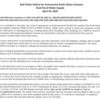fast forward: “Dirty Dozen” tax scams to watch out for
Every year the Internal Revenue Service (IRS) releases its list of tax scams, spotlighting the myriad ways that people try to separate you from your money.
Here’s a list of their top (worst) 12:
Identity Theft
Using your personal information, an identity thief can file a fraudulent tax return and claim a refund. If you’ve been a victim of stolen personal information, you can contact the IRS so the agency can protect your tax account.
Phishing
Be wary of fake emails or websites looking to steal your personal information. If you receive a request for information that appears to be from the IRS, contact the IRS directly to verify the request.
Telephone Scams
Scammers will contact you pretending to be from the IRS. They may say that you are due a large refund or owe money (even threatening arrest or revocation of your driver’s license). If you receive such a call, call the IRS and contact the Federal Trade Commission using their “FTC Complaint Assistant” at FTC.gov.
Promises of “Free Money”
Posing as tax preparers, scam artists may promise large tax refunds and charge big fees, while filing false returns with big refunds payable to them. Individuals may never know a tax filing was ever made in their name.
Return Preparer Fraud
Dishonest preparers may use tax preparation as an excuse to steal your personal information, so only use a preparer who signs the return and has an IRS Preparer Tax Identification Number.
Hiding Income Offshore
The IRS has strengthened its ability to identify offshore holdings, and the failure to report them will be costly.
Impersonation of Charitable Organizations
Fraudulent charities raise money or obtain private information from individuals looking to help. Donate only to recognized charities and beware of charities whose names sound similar to the well-known ones.
False Income, Expenses or Exemptions
Falsifying your tax return is a high risk, low reward exercise, especially in this age of Big Data.
Frivolous Arguments
Ignore promoters of frivolous arguments that promise you tax relief. Not only are they expected to fail, but you may be subjected to penalties and possible jail time.
Falsely Padding Deductions or Returns
Dishonestly reporting deductions to reduce tax bills or inflate refunds may open you up to penalties and prosecution.
Abusive Tax Structures
If someone is proposing to eliminate or substantially reduce your taxes through complex tax structures, walk away — they may be offering nothing more than illegal tax evasion.
Excessive Claims for Business Tax Credits
This happens when taxpayers or their tax preparers improperly claim the research credit or the fuel tax credit, which is generally limited to off-highway uses, such as farming.
Securities offered through Royal Alliance Associates, Inc. Member FINRA, SIPC. Advisory services offered through Matt Montgomery, a Registered Investment Advisor not affiliated with Royal Alliance Associates, Inc., 1504 E. Rusk, Jacksonville, 903-586-3494.
* An Index is a portfolio of specific securities (common examples are S&P, DJIA, NASDAQ), the performance of which is used as a benchmark in judging the relative performance of certain asset classes. Indexes are unmanaged portfolios and investors cannot invest directly in an index. Past performance is not indicative of future results.
Please support The Cherokeean Herald by subscribing today!
You may also like:








